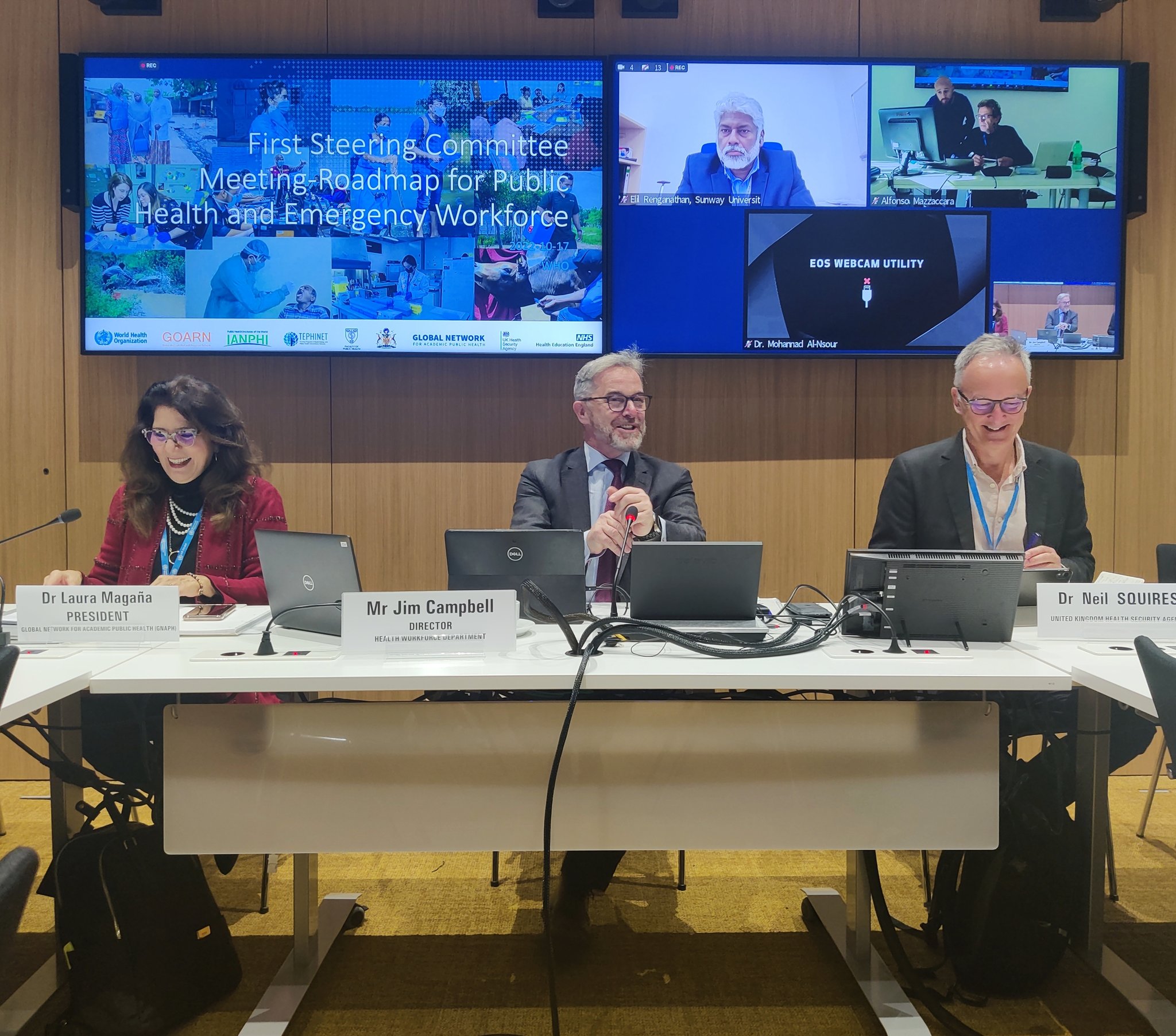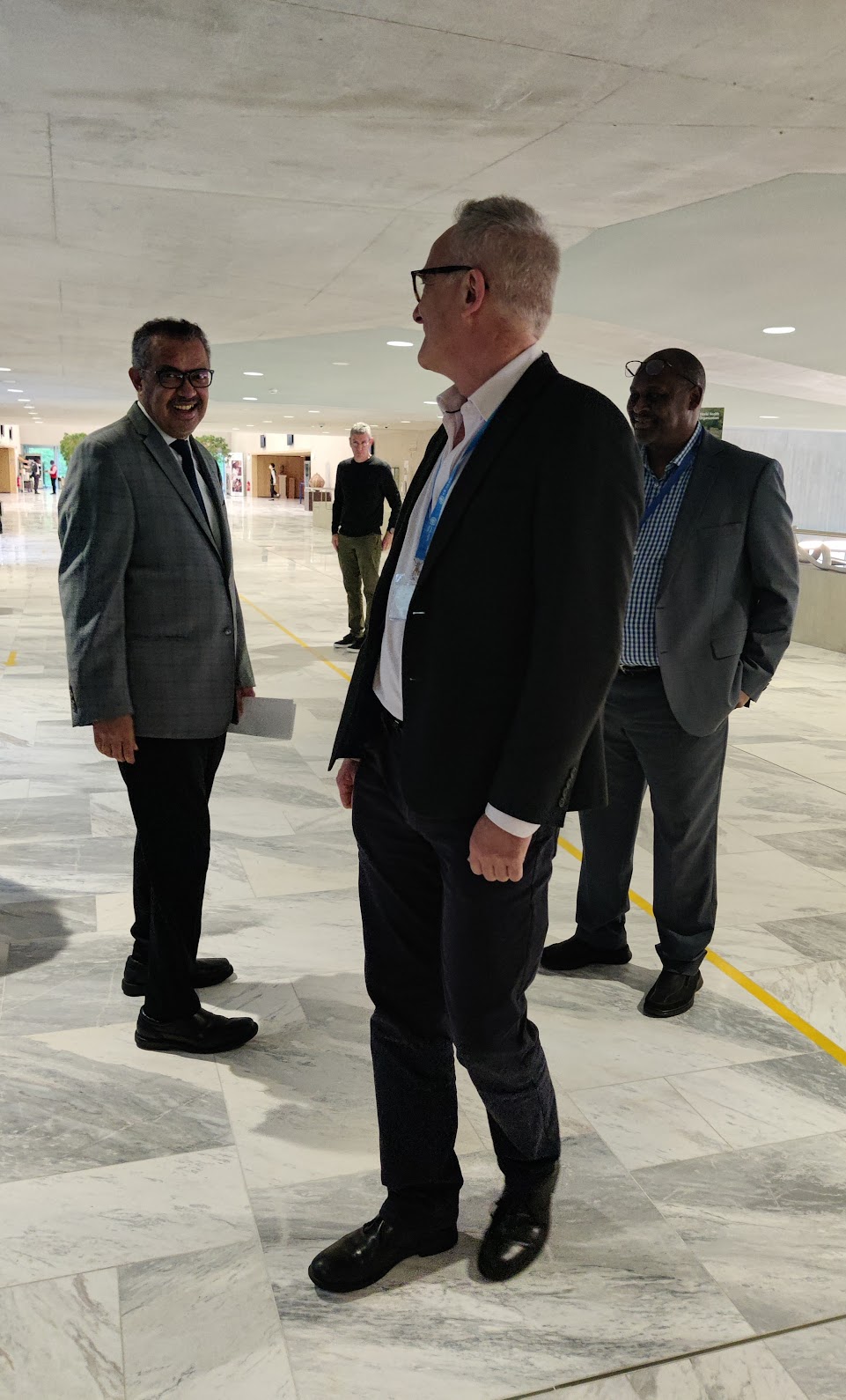An Action Plan for Building Public Health and Emergency Preparedness and Response Capacity

Laura Magaña, president and CEO, ASPHER, Jim Campbell, director, health workforce, WHO, and Neil Squires, representing IANPHI
Credit: Catherine Kane
On behalf of IANPHI, Prof. Neil Squires, director of global public health at the UK Health Security Agency, participated in a meeting of the steering committee on the public health and emergency workforce convened by the World Health Organization (WHO), which was held in Geneva on October 17-19, 2022. WHO has established a steering committee to take forward the WHO and partner Roadmap for National Workforce Capacity to Implement the Essential Public Health Functions. The roadmap sets out a five-year vision to strengthen capacity across all WHO member states for a multidisciplinary workforce to undertake the essential public health functions (EPHFs), including emergency preparedness and response (EPR).
A member of the steering committee was the Association of Schools of Public Health in the European Region (ASPHER), with which IANPHI has signed a memorandum of understanding. ASPHER has supported the development of a European Public Health Skills and Competency Framework and has been involved with the wider global network of schools of public health supporting work to develop similar framework for other regions. Other committee members included representatives from the World Federation of Public Health Associations, GOARN (Global Outbreak Alert and Response Network), TEPHINET (Training Programs in Epidemiology and Public Health Interventions Network), and representatives of the public health academic community and WHO regional offices.
The committee reflected a growing consensus that the public health system, including pandemic and epidemic surveillance and response capability, must prioritize systematic and strategic investment in the public health workforce. National Public Health Institutes (NPHIs) will be essential to ensure that the governance and professional structures necessary to support the professionalization of the public health workforce are in place.
100 Country Target
The meeting focused on outlining five workstreams: (1) the importance of EPHFs as a lens to strengthening global public health workforce, (2) the use of competency-based education as an approach to developing the skills and abilities of the public health workforce to support the delivery of the EPHFs, (3) the opportunity to identify improvements in current workforce through mapping and measurement framework, (4) the alignment of the roadmap to existing global architectures such as the G7 and G20, and (5) effective communication of the roadmap and action plan to support implementation in member states.
The steering committee discussed how to align partner contributions, including those of NPHIs, behind an ambitious two-year plan (2022-2024). This work with countries will entail mapping the existing public health workforce; identifying resources currently available to support that workforce; considering existing public health job descriptions in relation to the EPHFs to better understand how the existing workforce currently contributes to this agenda; and developing the skill and competency sets that are essential for an effective national public health workforce.
The guiding target set for the two-year plan is to ensure that 100 countries have utilized the tools developed by the various workstreams to benchmark themselves against a global list of EPHFs, have established competency-based standards for the performance of the tasks and subfunctions of the EPHFs and identified the health and non-health occupations performing some or all of the EPHFs. Additionally, 50 new countries should, ideally, be at full implementation of integrating EPHFs into health work-force planning, enforcing competency-based standards for employment, assessment and identification of training needs and use this data to enforce workforce policies and plans.
Next Steps
IANPHI made a commitment to share and promote the roadmap and to work with IANPHI members in support of the mapping of the public health workforce as well as in promoting and supporting countries develop their approach to building public health skills and competencies.
Dr. Tedros and Prof. Squires Credit: Catherine Kane
Prof. Squires highlighted the work that IANPHI has been doing on Integrated Disease Surveillance, which was also shared during a G7 Technical Meeting (read in box below) in Berlin, and presented to the Bill & Melinda Gates Foundation and other partners, and during the World Health Summit 2022. There is an important synergy between IANPHI’s commitment to support stronger national surveillance systems and better emergency preparedness and rapid response capability. This will be an important area for active IANPHI engagement over the coming months.
A highlight of the discussions was a session facilitated by two early career professionals, Mehreen Hunter from South Africa and Fatai Ogunlayi from the UK, who spoke passionately about the need to engage early career professionals in informing the public health structures that will shape their careers and the future of health service delivery. WHO Director General Dr. Tedros stopped by the meeting, indicating the importance that WHO leadership attaches to this agenda.